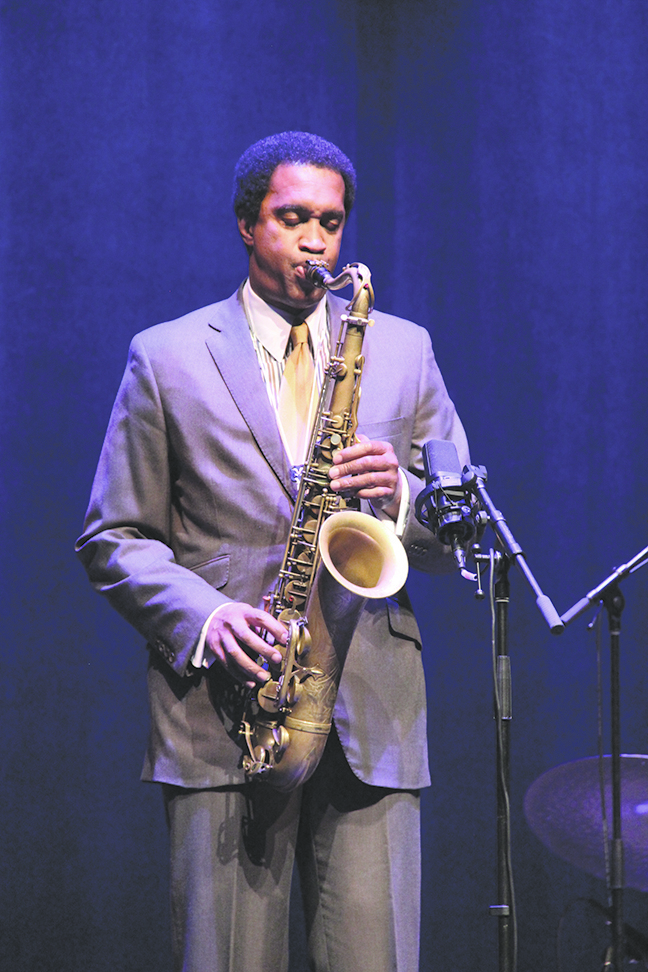by Lee Pierre

Often referred to as a gifted tenor saxophonist and educator, Javon Jackson proved that he was truly that and more. He is known for his acoustic post-bop and funky soul jazz, and both were prevalent as he and his trio performed Friday night (9/23) at the Jefferson Center in downtown Roanoke. Jackson was accompanied by an outstanding group of musicians featuring pianist Jeremy Manasia, bassist David Williams and drummer Willie Jones III, who together performed through an evening of uniquely vibrant selections enhanced by the musings of poet Nikki Giovanni.
“The Gospel According to Nikki Giovanni” is a remarkably creative presentation of jazz, spirituals, vocals, and spoken word. Jackson opened the concert with “My Shining Hours,” a tribute to the legendary John Coltrane, performed with a spotlight on the bassist and drummer.
“The project is personal for me. I come from a lineage of devout Christians, and that has afforded me the chance to connect with that ancestral stream,” Jackson said.

Jackson of Carthage, Missouri, was born into a musical family. His mother was a pianist and his father was a trumpeter. He started playing the alto sax at the age of 10 and changed over to tenor sax during his teen years. He stated that hymns and spirituals have a strong connection emphasizing despair yet hope through an oppressive history. The music of that era provided support through troubled times.
“A lot of times when I’ve heard this song in church, it’s a little faster, a little more upbeat,” Jackson said. “I wanted to make it slower, where I could really expose the melody a lot more and lay on some of those phrases – so I could be as emotive as possible with the melody as if I was playing in church with people in the audience.”
Other selections were played with the same passion and fervor. The quartet’s rendition of the dirge-like “Sometimes I Feel Like a Motherless Child” carries the somber feeling of Coltrane’s “Equinox.”

“Wade in the Water,” a mid-tempo swing paced by Williams’ astonishing bassline and Jones’ steady syncopated pulse. After Jackson delivered a robust tenor solo and Manasia followed suit with an earthy piano solo, Giovanni shared some wisdom from her poem “A Very Simple Wish.”
Giovanni also sang on one selection, obviously nervous about doing so, she stopped Jackson exclaiming, “We’ve got to do that over. I’m nervous.” This one particular selection that Giovanni wanted to perform was Nina Simone’s “Night Song,” as a tribute to Simone.
“Nina Simone was a dear friend and if we could do something, I want to sing this particular song for Nina,’” Giovanni said.

Singing is not something Giovanni ever thought she’d do, but “Night Song” represents many things for her, including Simone’s decision to leave the U.S. in search of belonging after experiencing the brutality of American racism – a topic she often sang, composed and rose up against as an activist through the sixties.
The audience patiently waited as Giovanni regained composure and sang while Jackson and the others played softly so that her voice could easily be heard. Close to the end, leaving the small incident of stage fright behind, Giovanni sang acapella the song “The Folks on the Hill” as Jackson and the band members looked on. The audience was truly delighted by Giovanni’s treatment of the jazz classic as she delicately tipped through the tune that she said was one of her favorites.
Doing what she does best, Giovanni then shared some of her poems with the audience.
“This music is something that people will probably be a little surprised to hear coming from me,” Jackson said. But given the state of the world, it could be just in time.
Standing on the shoulders of their ancestors, both Giovanni and Jackson worked their magic through this seamless collaboration bonding jazz and gospel with extraordinary results.

As one patron stated, “I could just imagine Coltrane, Ellington, and other jazz musicians sitting back admiring this young cat.”
The night was filled with surprises, great music, and plenty of special moments. Several people in the audience commented how it was not at all what they had thought it would be… “It was better!”





